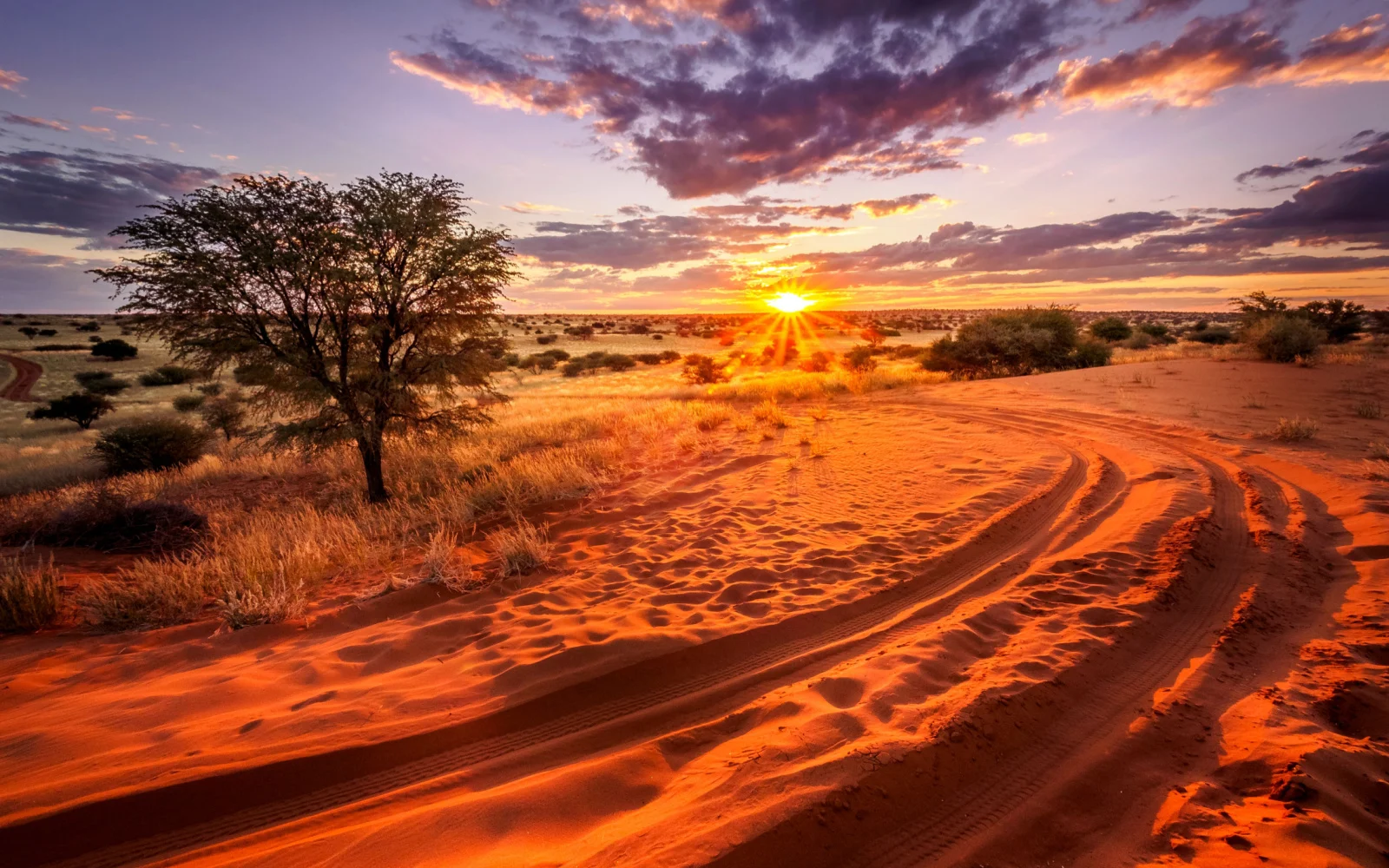The southern African country of Namibia is popular with travelers in the know that love nature and wildlife. Every year, the country receives an average of one million visitors, many of them foreign tourists in search of amazing nature.
The landscapes and wildlife are the primary attractions in Namibia.
Visitors flock to places such as Etosha National Park, which is the country’s largest wildlife reserve and more accessible and intimate than neighboring South Africa’s famous parks.
Take in the stunning desert landscapes in places such as Sossusvlei, Deadvlei, and Spitzkoppe. Namibia has many hidden gems just waiting for intrepid travelers to check them out.
However, you might be wondering if the views are worth any potential risks to your safety. It’s normal to worry about your safety when traveling, especially if you are going to a country that you don’t know much about.
But don’t worry — our travel experts put together this detailed travel guide to help you figure out if a trip to Namibia will be safe or not. Let us be your guide!
Is Namibia Safe to Visit in 2025?
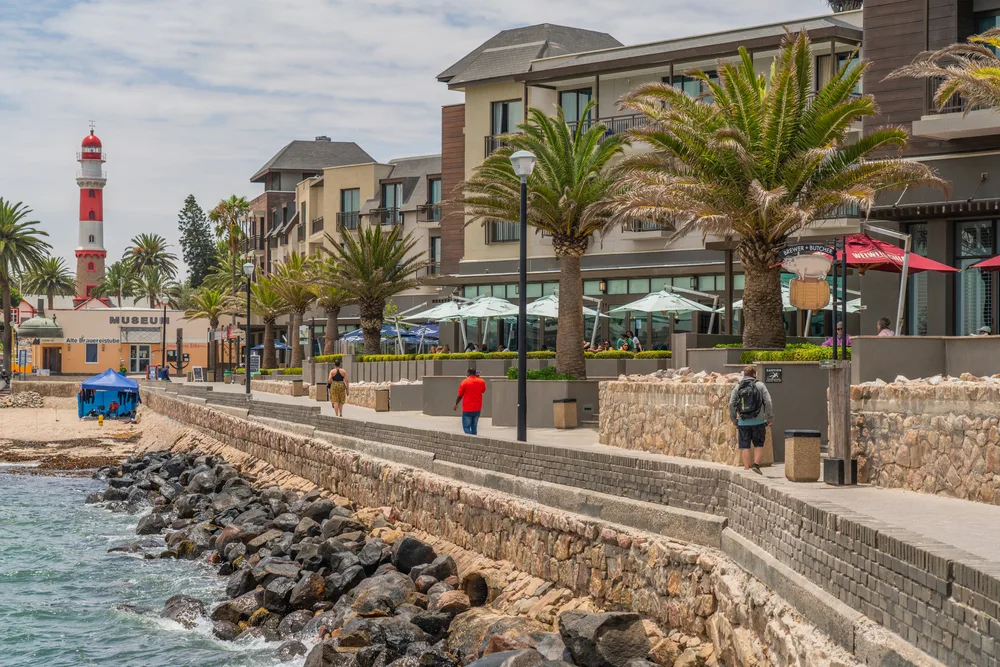
SWAKOPMUND, NAMIBIA – JAN 11, 2020: Promenade in Swakopmund. in the background the lighthouse/gg-foto/Shutterstock
Yes. For the most part, Namibia is a safe place to visit. It is a stable country with little civil unrest or violent conflict.
However, there is some crime around Windhoek and other cities, and the crime rate in some places is increasing. You will have to keep an eye out on your possessions as you travel.
A good place to start researching Namibia’s safety is different travel advisories. Most countries issue travel advisories for different places around the world to help their citizens travel safely.
When issuing these advisories, they tend to err on the side of caution, listing every possible danger tourists might encounter. Many countries are laid-back about their travel advisories for Namibia.
New Zealand doesn’t even issue a special travel advisory for Namibia. The United States just tells its citizens to exercise normal precautions in Namibia.
Other countries are more cautious about their advice for Namibia. For example, Canada advises its citizens to exercise a high degree of caution in Namibia due to the crime rates.
Common problems tourists might encounter in Namibia include:
- Pickpocketing
- Bag snatching
- Theft from vehicles
- Mugging
- Armed robbery
- Carjacking
- Banditry
Most crimes that occur in Namibia are petty in nature, but tourists have been victims of violent crime in the past. Violent crime incidents are often concentrated around certain parts of the country and at night.
In terms of political violence and other forms of conflict, Namibia is a low-risk country. According to the Global Peace Index, Namibia is #68 on the list of safest countries in the world and one of the safest in Africa.
However, conflict troubling its neighbors sometimes bleeds into Namibia. Travelers are often advised to avoid the Angolan border area due to the high risk of banditry.
You should also be mindful of Namibia’s extreme weather. Most of the time, the climate is very hot and arid. Dress appropriately for the weather with loose, light clothing that covers your skin to protect from the sun.
Make sure to apply plenty of sunscreen and drink lots of water. Namibia has a rainy season, which lasts from November to March.
During the rainy season, floods and flash floods can happen, devastating the country. Check the weather forecast before you go and monitor news sources while you are in the country to prepare in case of an emergency.
Crime in Namibia
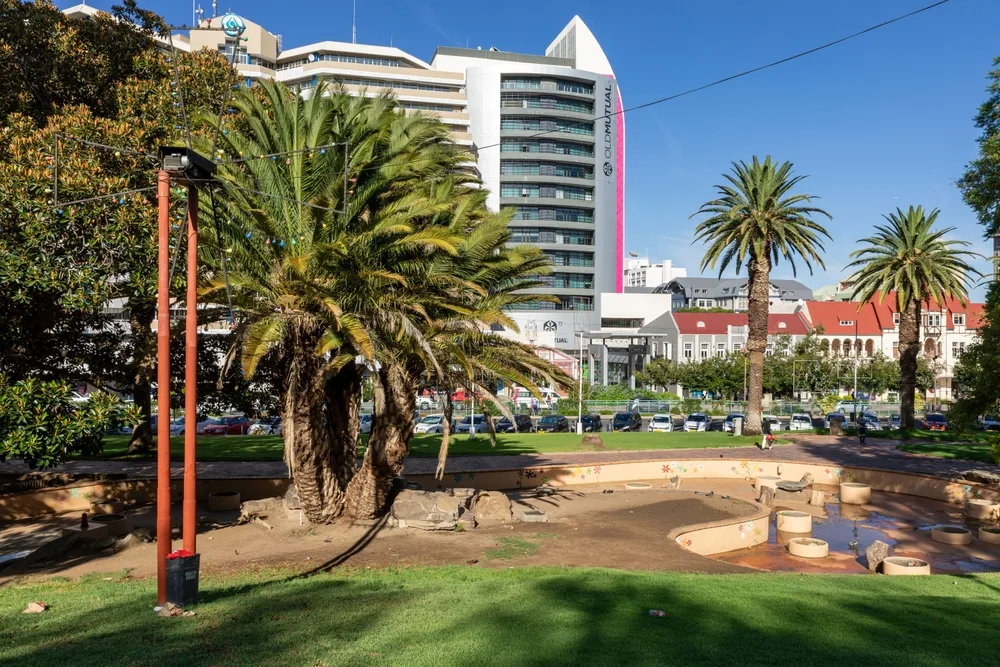
WINDHOEK, NAMIBIA – NOVEMBER 28 2022: City Center of Windhoek. Windhoek is the capital and the largest city of Namibia. Southern Africa/Curiso.Photography/Shutterstock
Crime is one of the primary concerns for people traveling abroad. Those traveling to Namibia are no different. People visiting this African country worry about losing their valuables or being the victim of a traumatic criminal encounter.
Visitors to Namibia are worried about crime with good reason. The country has a very high violent and property crime rate.
For an insight into how serious crime is in Namibia, all you have to do is look at the homicide data. According to the World Bank, Namibia’s homicide rate is 12 incidents per 100,000 people.
That is far above the global average and enough to classify Namibia as a country with a homicide epidemic. There are a few reasons for this high homicide rate.
One is the high rate of gun ownership in Namibia, including unlicensed guns. Criminal networks are also growing in power in Namibia, including street gangs and state-embedded actors.
Many homicides are connected to domestic violence cases. Namibia has one of the highest rates of domestic violence in Africa. Rape, assault, and even murder are often connected to familial violence (usually women are the victims of men).
The rates of other crimes are similarly high in Namibia. According to Numbeo, Namibia scores a 71.69 out of 100 on the crime index, which is a high value.
The crimes respondents worried about the most included break-ins, vehicle break-ins and thefts, muggings, theft, assault, and armed robbery. The most prevalent crime is corruption and bribery (which can also help explain why crime is so prevalent).
Social factors can help explain why Namibia’s crime rate is so high. Namibia has a high unemployment rate of about 20%, a high poverty rate, and a low social safety net.
Social factors such as poverty often push people towards crime so they can survive. If Namibia has such a high crime rate, how come so many countries issue low-level travel advisories for it?
That is because the high crime rate primarily affects locals, not tourists. If tourists experience crime, they are usually victims of low-level petty theft.
Most violent crime incidents are between people who know each other, such as two spouses. Crime in Namibia is also concentrated in bigger cities such as Windhoek.
Most visitors to the country make a beeline for natural parks and wilderness areas, and they don’t spend much time in the cities. In rural areas, crime still occurs, but it is much less frequent.
Petty Theft
Petty theft is the most likely crime that tourists might encounter on their visit to Namibia. Petty theft occurs in many forms in the country. The most common crimes are pickpocketing, bag snatching, fraud, and theft from vehicles.
The Canadian government warns its citizens about the prevalence of petty theft in Namibia. Pickpocketing and bag snatching occur often in Namibia’s cities such as Windhoek.
Tourists are often targeted for crimes because criminals know that foreigners are more likely to have cash and expensive items on hand than locals. Smartphones are particularly popular targets.
Make sure that you have a close eye on your valuables in Namibia at all times. Keep valuables in a secure place, such as a zipped bag, money belt, or front pocket. Never leave your valuables unattended.
Avoid flashing your valuables, which will draw unnecessary attention to you. For example, take your photos then put your phone or camera away instead of holding it in your hand.
Be careful when people try to distract you on the street as thieves often work in partnerships or groups. Credit card fraud is another common form of theft in Namibia. Some hotels and lodges allow guests to pay by card, then copy the card.
When you’re paying with a card, make sure that your card is always in sight. Only use secure ATMs and cover the keypad with your hand. Check the charges on your credit card regularly.
If you are renting a car in Namibia, know that theft from vehicles is common.
Thieves target cars parked at rest stops or even cars sitting in traffic. Make sure that you never leave your valuables in sight in your rental car and try to avoid leaving phones and wallets in the car when you are away.
When you park at a rest stop, make sure one person is always by the car. Only park in secure areas. Finally, make sure that your doors are always locked, and windows closed, even while you are driving.
Armed Robbery
While most crimes that tourists to Namibia experience are petty in nature, visitors sometimes experience more violent incidents. The most common violent crime you will encounter during a trip to Namibia is probably armed robbery.
Gun ownership is prevalent throughout the country, and robbers often wield firearms. They like to target foreigners as they make for more lucrative victims.
The Australian government warns about the prevalence of muggings and robberies targeting tourists. A common ruse criminals use is posing as a hitchhiker or someone that needs help by the side of the road.
Avoid stopping for strangers, especially after dark. The UK government also warns about the prevalence of violent robberies targeting tourists, especially after dark.
Street robberies are common, especially in the streets of Windhoek. Avoid walking around at night.
Unauthorized taxis often rob passengers. Even if the taxi driver himself isn’t a criminal, these taxis often pick up multiple passengers as they drive around, and one of your fellow passengers could be a criminal.
Avoid hailing taxis in the street and have your hotel call one for you. If you do hail a taxi, make sure that it has a Namibia Bus and Taxi Association logo, which shows that it is a government-licensed taxi.
Avoiding Bad Areas
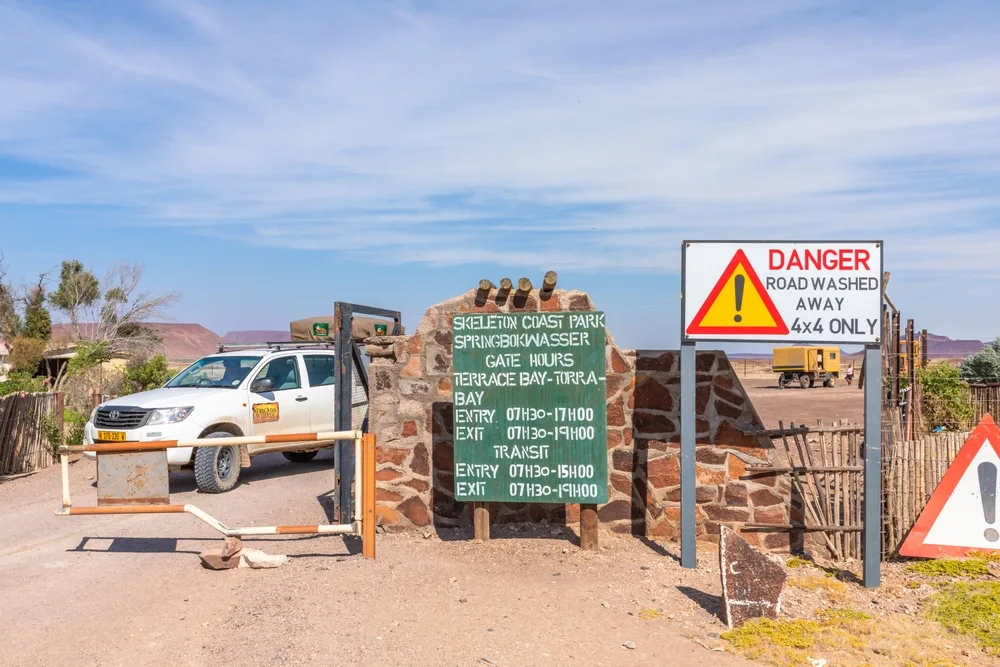
Skeleton Coast, Namibia – 07 19 2018: Springbokwasser Gate, Skeleton coast park/Gunter Nuyts/Shutterstock
Avoiding high crime areas in Namibia go a long way towards helping you stay safe. Be careful when visiting the capital, Windhoek, as that is where the most crimes against tourists occur.
Be especially careful when venturing outside of the city center and avoid any townships after dark. The city of Swakopmund is another crime hotspot. Many tourists visit because it is on the coast but stay alert during your trip.
Avoid the area near the Angolan border, such as the Kavango Region and the western part of Zambezi, due to the risk of unrest. The border area also has a high concentration of landmines.
Things to Consider
Here are a few additional tips for staying safe in Namibia:
- Road conditions in Namibia are poor. If you rent a vehicle, you will need 4WD. Roads, especially secondary roads, are poorly maintained and many people drive while intoxicated. Avoid driving at night.
- Be careful with the wildlife. Most people come to Namibia to spot animals in the wild, but make sure that you interact with them safely. Follow rules when visiting national parks. Never attempt to feed or touch wild animals. Animals such as elephants may cross the roads when you are driving, so be prepared.
- Ask before taking photographs. Many Namibians are sick of tourists photographing them without their consent. It is customary to give a small tip if you photograph someone, unless you know each other.
- Namibia is a conservative Christian country. Respect local norms by dressing modestly outside of resort areas (this applies to men as well as women). This conservative attitude affects the treatment of LGBT travelers.
Frequently Asked Questions
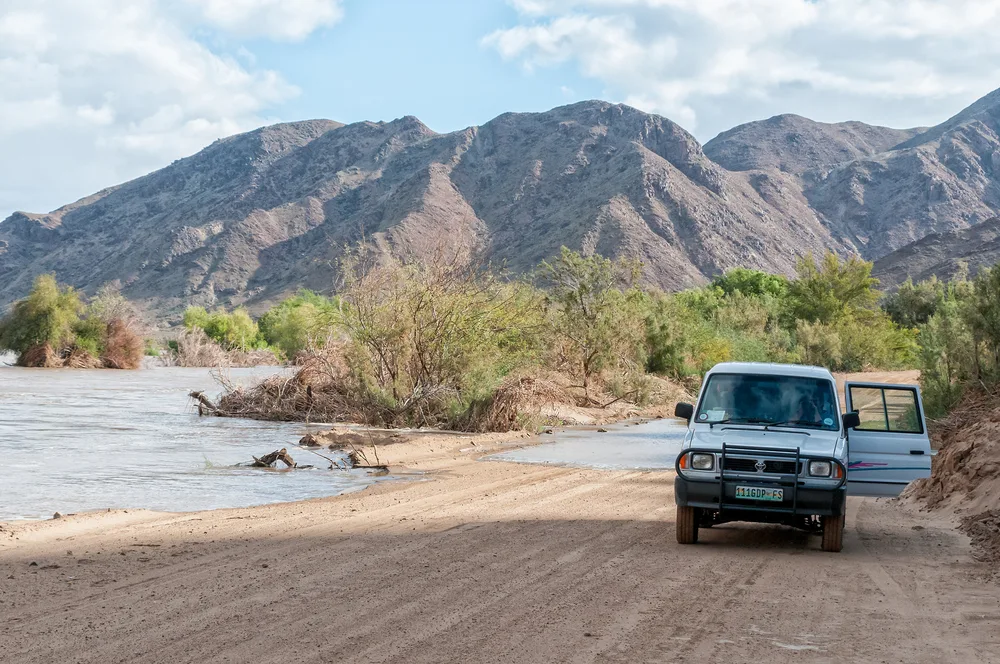
SENDELINGSDRIFT, NAMIBIA – JUNE 16, 2011: View of road C13 and the Orange River in flood on the border between Namibia and South Africa between Sendelingsdrift and Aussenkehr/Grobler du Preez/Shutterstock
Here are a few additional questions you may want to get answers to before heading to Namibia:
How safe is Namibia vs. South Africa?
Like South Africa, Namibia has a high crime rate. However, the crime rate is lower in Namibia than in South Africa. Tourists to Namibia also have a lower chance of being the victims of violent crimes than in South Africa.
Is Namibia expensive or cheap?
Namibia is an affordable travel destination once you pay for your flights. While there are luxury resorts, the country is full of budget-friendly accommodation options as well.
Is Namibia a malaria risk?
There is a high risk of malaria if you travel to Namibia. Make sure that you stock up on antimalarial drugs before you go and take precautions to prevent mosquito bites.
Is it worth it to go to Namibia?
Yes, it is worth it to go to Namibia. The country has stunning nature and wildlife viewing opportunities that you can’t find anywhere else.
So, Is It Safe to Visit Namibia?
For the most part, Namibia is a safe country to visit. You should be on your guard in big cities such as Windhoek, but most crimes you are likely to encounter will be petty in nature. So what are you waiting for — book your trip today and experience all that this idyllic country has to offer!



